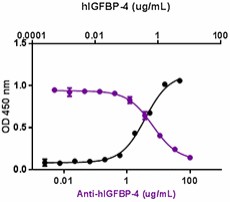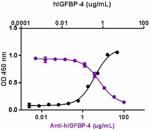- Clone
- A15038E (See other available formats)
- Regulatory Status
- RUO
- Other Names
- Insulin-like growth factor-binding protein 4, IBP4
- Isotype
- Mouse IgG2a, κ
- Ave. Rating
- Submit a Review
- Product Citations
- publications

-

Recombinant human IGFBP-4 binds human IGF-I in a dose-dependent manner (black circles). The binding of human IGF-I to human IGFBP-4 is blocked (purple circles) by increasing concentrations of anti-human IGFBP-4 monoclonal antibody (Clone A15038E). The ND50 is typically 4 - 12 µg/mL.
| Cat # | Size | Price | Save |
|---|---|---|---|
| 697403 | 100 µg | ¥44,820 | |
| 697404 | 1 mg | ¥118,690 |
Human IGFBP-4 was initially cloned from the human placenta, liver, and ovary cDNA libraries. Seven IGFBPs has been described that modulate the IGF activity. IGFBPs structurally are characterized by three domains: the amino-terminal, the carboxyl-terminal, and an intermediate variable L-domain. Some IGFBPs bind to the extracellular matrix (IGFBP-2, -3, and -5) or the cell membrane (IGFBP-1, -2, -3, and -5). The IGF binding activity of IGFBP-4 is mainly localized in the N-terminal region. IGFBP-4 is the smallest IGFBP, and there is no evidence for cell surface or ECM association of IGFBP-4. In addition, it contains an N-linked glycosylation site and exists in biological fluids as a doublet of 24 kD nonglycosylated and a 28 kD glycosylated forms. IGFBP-4 binds both IGF-I and IGF-II with similar affinities. Nevertheless, it is generally coexpressed with IGF-II during development. Proteolysis is the main regulatory mechanism of IGFBP-4 activity. Pregnancy-associated plasma protein-A (PAPP-A) was identified as an IGF-dependent IGFBP-4 protease. It belongs to the metzincin superfamily of metalloproteinases and cleaves IGFBP-4 at a single site. IGFBP-4 has potent IGF-independent anti-angiogenic and antitumorigenic effects, activities that are located in the C-terminal, and a region containing a thyroglobulin type 1 (Tg1) domain.
Product DetailsProduct Details
- Verified Reactivity
- Human
- Antibody Type
- Monoclonal
- Host Species
- Mouse
- Immunogen
- Recombinant human IGFBP4
- Formulation
- 0.2 µm filtered in phosphate-buffered solution, pH 7.2, containing no preservative.
- Endotoxin Level
- Less than 0.01 EU/µg of the protein (< 0.001 ng/µg of the protein) as determined by the LAL test.
- Preparation
- The Ultra-LEAF™ (Low Endotoxin, Azide-Free) antibody was purified by affinity chromatography.
- Concentration
- The antibody is bottled at the concentration indicated on the vial, typically between 2 mg/mL and 3 mg/mL. Older lots may have also been bottled at 1 mg/mL. To obtain lot-specific concentration and expiration, please enter the lot number in our Certificate of Analysis online tool.
- Storage & Handling
- The antibody solution should be stored undiluted between 2°C and 8°C. This Ultra-LEAF™ solution contains no preservative; handle under aseptic conditions.
- Application
-
Blocking - Quality tested
- Recommended Usage
-
Each lot of this antibody is quality control tested by blocking activity. The ND50 is 4 - 12 µg/mL. It is recommended that the reagent be titrated for optimal performance for each application.
- RRID
-
AB_2687181 (BioLegend Cat. No. 697403)
AB_2687181 (BioLegend Cat. No. 697404)
Antigen Details
- Distribution
-
It is expressed in a variety of tissues and cells such as embryonic and postnatal brain, human osteoblast-like cells, skin fibroblasts, endothelial cells, epithelial cells, intestinal epithelium, and in a variety of tumor cells.
- Function
- IGFBP-4 inhibits the action of IGFI and II by preventing their binding to their receptors. The binding affinity of IGFBP-4 for IGFs is regulated by proteolysis through PAPP-A.
- Ligand/Receptor
- IGF-I, IGF-II
- Biology Area
- Angiogenesis, Cancer Biomarkers, Cell Biology, Cell Proliferation and Viability
- Antigen References
-
1. Shimasaki S, et al. 1990. Molecular Endocrinol. 4:1451.
2. Boldt HB, et al. 2001. Biochem. J. 358:359.
3. Bunn RC and Fowlkes JL. 2003. Trends Endocrinol. Metab. 14:176.
4. Ning Y, et al. 2008. Mol. Endocrinol. 22:1213.
5. Moreno MJ, et al. 2013. Neoplasia. 5:554.
6. Contois LW, et al. 2012. J. Biol. Chem. 287:1779.
7. Shi Z, et al. 2013. Am. J. Physiol. Gastrointest. Liver Physiol. 305:G74. - Gene ID
- 3487 View all products for this Gene ID
- UniProt
- View information about IGFBP-4 on UniProt.org
Related Pages & Pathways
Pages
Related FAQs
- Do you guarantee that your antibodies are totally pathogen free?
-
BioLegend does not test for pathogens in-house aside from the GoInVivo™ product line. However, upon request, this can be tested on a custom basis with an outside, independent laboratory.
- Does BioLegend test each Ultra-LEAF™ antibody by functional assay?
-
No, BioLegend does not test Ultra-LEAF™ antibodies by functional assays unless otherwise indicated. Due to the possible complexities and variations of uses of biofunctional antibodies in different assays and because of the large product portfolio, BioLegend does not currently perform functional assays as a routine QC for the antibodies. However, we do provide references in which the antibodies were used for functional assays and we do perform QC to verify the specificity and quality of the antibody based on our strict specification criteria.
- Does BioLegend test each Ultra-LEAF™ antibody for potential pathogens?
-
No, BioLegend does not test for pathogens in-house unless otherwise indicated. However, we can recommend an outside vendor to perform this testing as needed.
- Have you tested this Ultra-LEAF™ antibody for in vivo or in vitro applications?
-
We don't test our antibodies for in vivo or in vitro applications unless otherwise indicated. Depending on the product, the TDS may describe literature supporting usage of a particular product for bioassay. It may be best to further consult the literature to find clone specific information.
Other Formats
View All IGFBP-4 Reagents Request Custom Conjugation| Description | Clone | Applications |
|---|---|---|
| Ultra-LEAF™ Purified anti-human IGFBP-4 | A15038E | Block |
Compare Data Across All Formats
This data display is provided for general comparisons between formats.
Your actual data may vary due to variations in samples, target cells, instruments and their settings, staining conditions, and other factors.
If you need assistance with selecting the best format contact our expert technical support team.
-
Ultra-LEAF™ Purified anti-human IGFBP-4

Recombinant human IGFBP-4 binds human IGF-I in a dose-depend...








Follow Us